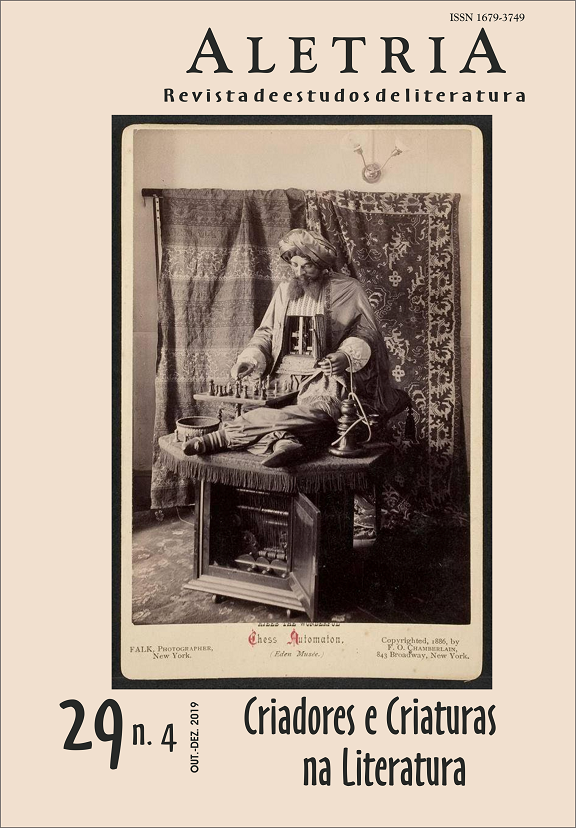“Your Words and Your Performances Are no Kin Together”: A Study on the Clown from Shakespeare’s Drama
DOI:
https://doi.org/10.17851/2317-2096.29.4.29-48Keywords:
clown, script, performance, ShakespeareAbstract
Formed by a blend of actor and character, the clown from the Shakespearean stage did not submit to the tyranny of the script: his performance was marked by improvisation and spontaneous interactions with the audience. This paper aims at transcending the boundaries of a textual analysis of the Bard’s drama so as to shed light on the clown, a creature of the Elizabethan and Jacobean drama who challenged and reinvented the play as conceived by the dramatist. In this liminal space between stage and reality, the clown’s performance stole the scene, turning the dramatic experience into an unpredictable event for playgoers.
Downloads
References
BELL, Robert. Shakespeare’s Great Stage of Fools. New York: Palgrave-Macmillan, 2011. DOI: https://doi.org/10.1057/9780230337725.
CHARLES, Lucile Hoerr. The Clown’s Function. The Journal of American Folklore, v. 58, n. 227, p. 25-34, 1945. DOI: https://doi.org/10.2307/535333.
DOBSON, Michael; WELLS, Stanley (eds.). The Oxford Companion to Shakespeare. Oxford: Oxford University Press, 2001.
GURR, Andrew. Shakespeare’s Playhouses. In: KASTAN, David (ed.). A Companion to Shakespeare. Oxford: Blackwell, 1999, p. 362-376. DOI: https://doi.org/10.1111/b.9780631218784.1999.00023.x.
HUIZINGA, Johan. Homo ludens. O jogo como elemento da cultura. Tradução de João Paulo Monteiro. São Paulo: Editora Perspectiva, 2012.
KASTAN, David. Shakespeare and the Book. Cambridge: Cambridge University Press, 2001.
PREISS, Richard. Clowning and Authorship in Early Modern Theatre. Cambridge University Press, 2015. DOI: https://doi.org/10.1017/CBO9781139567794.
SHAKESPEARE, William. Tradução de Barbara Heliodora. Teatro completo. Rio de Janeiro: Nova Aguilar, 2009. 3 v.
SOUTHWORTH, John. Fools and Jesters at the English Court. Gloucestershire: Sutton Publishing, 1998.
VIDEBAEK, Bente. The Stage Clown in Shakespeare’s Theatre. London: Greenwood Press, 1996.
WEIMANN, Robert; BRUSTER, Douglas. Shakespeare and the Power of Performance: Stage and Page in the Elizabethan Theatre. Cambridge: Cambridge University Press, 2009. DOI: https://doi.org/10.1017/CBO9780511481437.
WILES, David. Shakespeare’s Clown: Actor and Text in the Elizabethan Playhouse. Cambridge: Cambridge University Press, 1987. DOI: https://doi.org/10.1017/CBO9780511553417.
Downloads
Published
How to Cite
Issue
Section
License
Copyright (c) 2019 Erika de Freitas Coachman (Autor)

This work is licensed under a Creative Commons Attribution 4.0 International License.
Authors who publish with this journal agree to the following terms:Authors retain copyright and grant the journal right of first publication with the work simultaneously licensed under a Creative Commons Attribution Non-Commercial No Derivatives License that allows others to share the work with an acknowledgement of the work's authorship and initial publication in this journal.Authors are able to enter into separate, additional contractual arrangements for the non-exclusive distribution of the journal's published version of the work (e.g., post it to an institutional repository or publish it in a book), with an acknowledgement of its initial publication in this journal.Authors are permitted and encouraged to post their work online (e.g., in institutional repositories or on their website) prior to and during the submission process, as it can lead to productive exchanges, as well as earlier and greater citation of published work (See The Effect of Open Access).





